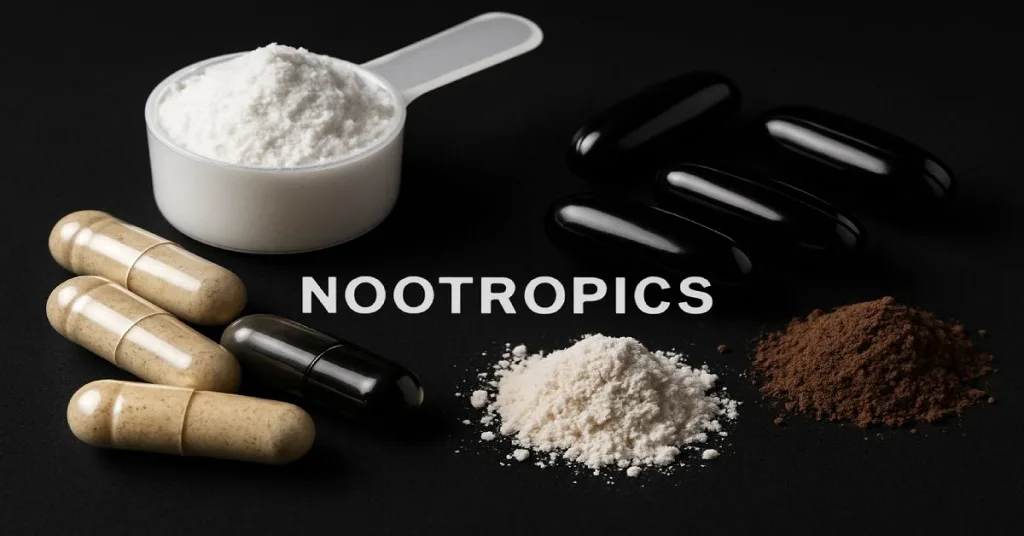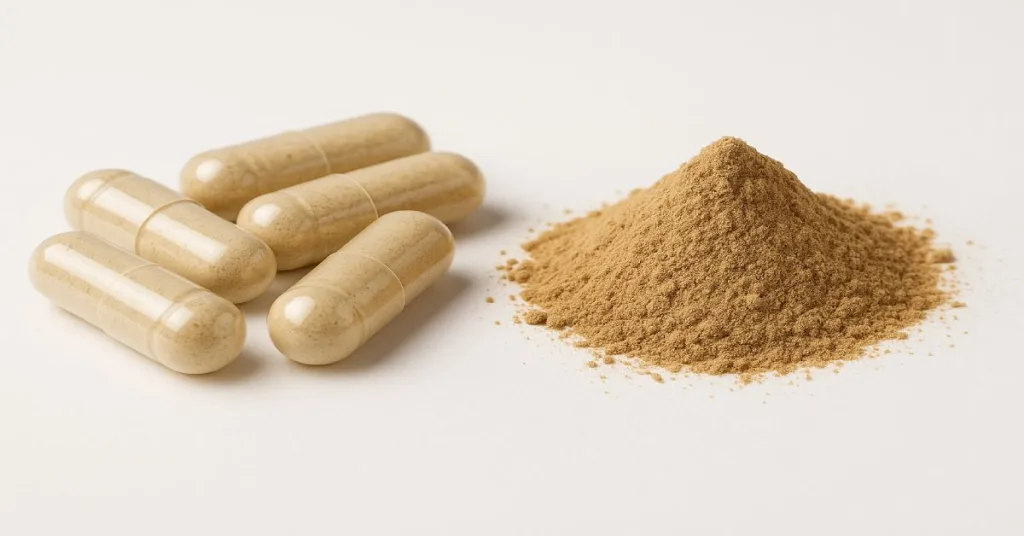The Truth About Nootropics
Search “best nootropics” online and you’ll get buried under flashy blends that promise genius-level IQ, endless energy, and laser focus. The problem? Most of those “brain booster” stacks are overhyped, under-dosed, and overpriced.
Nootropics aren’t magic pills. But the right ones — backed by human research — can sharpen focus, support memory, and improve long-term brain health. The key is separating hype from evidence.
This list covers 10 nootropics that actually work, backed by studies and real-world results.
This post may contain affiliate links. If you click and purchase, I may earn a small commission at no extra cost to you. I only recommend products I personally use or have thoroughly researched.

Criteria for “Work”
For this guide, “works” means:
- Backed by human clinical trials (not just mice).
- Safe in standard doses.
- Affordable in single-ingredient form.
- Noticeable effects on focus, memory, or energy.
No shady “limitless pill” blends here — just proven nootropics.
1. Caffeine + L-Theanine
The most common nootropic combo isn’t exotic at all. Caffeine boosts alertness by blocking adenosine receptors, while L-theanine (found in tea) smooths the jitters and anxiety that caffeine alone can trigger.
Studies show the combo improves focus, attention, and reaction time better than caffeine alone.
Best for: Students, professionals, and anyone needing sharper focus without anxiety.
2. Creatine
Known mostly for gym gains, creatine is also a brain booster. Your brain uses creatine for quick energy, and supplementing can improve short-term memory and reasoning, especially in people under stress or on plant-based diets. Research originally focused on athletes now shows creatine supplementation also benefits memory and reasoning, particularly under stress or in people on plant-based diets.
Best for: Students during exams, older adults, and vegetarians. See research
3. Lion’s Mane Mushroom
This shaggy mushroom contains compounds (hericenones and erinacines) that stimulate nerve growth factor (NGF). Early studies suggest Lion’s Mane may support memory, focus, and even long-term brain health.
Best for: Memory support and long-term brain protection.
4. Rhodiola Rosea
An adaptogen that helps the body handle stress, Rhodiola has been shown to reduce fatigue, improve mood, and enhance mental performance under pressure.
Best for: Burnout, stress, and long workdays.

5. Bacopa Monnieri
A staple of Ayurvedic medicine, Bacopa improves memory and learning — but it takes time. Studies show consistent use over 8–12 weeks boosts recall and reduces anxiety.
Best for: Long-term memory and learning capacity.
6. Alpha-GPC
Alpha-GPC is a choline donor, meaning it provides the raw material your brain uses to make acetylcholine, a neurotransmitter crucial for memory and learning. Research shows Alpha-GPC enhances cognition and may support brain recovery after injury.
Best for: Memory, learning, and cognitive performance.
7. Panax Ginseng
Ginseng has centuries of use in traditional medicine and modern evidence suggests it improves mood, reduces fatigue, and enhances cognitive function. Some studies show benefits for memory and calmness.
Best for: Energy, mood, and focus.
8. CoQ10
Best known for heart health, CoQ10 also plays a role in brain energy production. Low levels are linked to fatigue and neurodegeneration. Supplementing may support mitochondrial function, improving mental energy and protecting brain cells.
Best for: Mental energy and long-term brain support, especially in older adults.
9. Omega-3s (DHA & EPA)
Omega-3 fatty acids are critical for brain structure and function. DHA supports neuron membranes, while EPA helps reduce inflammation. Higher intake is linked to improved memory, learning, and mood stability.
Best for: Overall brain health and mood support.
10. Nicotine Microdosing (Controversial)
This one raises eyebrows — nicotine in small, controlled doses has been shown to enhance attention, working memory, and focus. Unlike smoking, microdosing uses low-dose lozenges or gums. While controversial, low-dose nicotine has been studied for its effects on attention and working memory. Research suggests it can enhance focus and short-term cognitive performance in controlled settings.
Best for: Short bursts of focus (but not recommended for long-term use or those prone to addiction).
Stacking Caution
Some nootropics pair well (like caffeine + L-theanine), but stacking too many can cause side effects: insomnia, headaches, or overstimulation. Always introduce one at a time, and don’t chase “super stacks” that promise everything in a capsule.
What to Buy vs Avoid
Worth buying:
- Single-ingredient supplements like Lion’s Mane, Rhodiola, or Alpha-GPC from trusted brands.
- Basic staples like creatine and omega-3s.
Avoid:
- Overpriced blends with a “proprietary formula” hiding underdosed ingredients.
- Supplements that promise instant genius-level IQ or “limitless” abilities.
Final Verdict
Nootropics aren’t miracle pills. But the right ones — caffeine + L-theanine, creatine, Lion’s Mane, and others — really do move the needle. They can help with energy, memory, mood, and long-term brain health if used consistently and smartly.
For best results, pick a few well-researched nootropics, start with single ingredients, and track how you feel. Don’t fall for hype — stick with science.